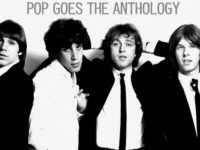If you want to really scare yourself, wait until everybody else in the house has gone to bed, turn out all of the lights, and put the Kronos Quartet’s Black Angels on the stereo. You will be assaulted with George Crumb’s terrifying “Black Angels (Images I),” a piece so full of tension and release (or maybe just tension…it’s been a while and honestly, just the thought of it is making me nervous) that you will feel like you’ve done aerobics after it’s over.
That particular incarnation of the quartet, together for so many years, was absolutely fearless in their approach to material. Their talent and vision allowed them to tackle musics as diverse as Crumb, Thelonius Monk, Philip Glass, Bill Evans, and Astor Piazzolla. When cellist Joan Jeanrenaud left the group in the late 1990’s, I wondered what direction she would take. I mean, Kronos had covered so much ground. What was left to accomplish?
The answer to that was, “Quite a lot, actually.” Sure enough, Jeanrenaud has been involved in all manner of new music projects, from solo works to collaborations with the likes of Fred Frith and Hamza El Din to film scores. This might make it sound like Jeanrenaud lacks a sense of humor, being a “serious” contemporary musician & all, but that perception is way off. The just-released Pop-Pop should set things right. A fun & funky collaboration with producer/percussionist PC Muñoz, this album mashes up 20th Century high art with beats designed to get your body parts in motion.
With Jeanrenaud playing the acoustic and electric celli, and Munñoz providing both electronic and acoustic percussion, the album’s intrigue is built on the obvious contrasts between old and new. Take “Noise,” as an example. Starting out over a straight and relatively simply beat, Jeanrenaud layers on the nervous energy with four simple notes. But just when we think this might be an exercise of straining against the darkness, the funk beat takes over and the mood is instantly transformed. The piece does employ tension effectively during breaks when Jeanrenaud revisits those shadowy notes, overdubbed cello swirling in the background.
Other tracks on Pop-Pop convey as sense of whimsy and sheer joy. Check out the funk of “Snake,” the futuristic blurp of “Where’s Raymond?”, the Asian (or techo, I can’t quite decide) vibe of “Snake.”
None of this is to imply that Jeanrenaud has lost all touch with her previous nature. “Dive” can almost be heard as a companion piece to “Black Angels,” making music from the inspiring source material of dissonance. After that powerful and introspective dirge, the album closes out with the bouncy, almost video game-ish “Freakbeat.” If the listener is able to hold back from the random body part shakin’, professional help may be in order.
Counseling might also be in order if your idea of a good time is to listen to George Crumb in the dark. At least that’s what the “normal” people might say. Me, I’m more than happy to indulge in the mental aerobics.
- Why the Rolling Stones’ Harrowing ‘Gimme Shelter’ is Still Revealing New Depths - November 18, 2024
- How Talking Heads’ ‘Fear of Music’ Opened Up a World of Art and Sound - August 5, 2024
- How Deep Cuts Propelled Bruce Springsteen’s ‘Born in the U.S.A.’ - June 4, 2024




